Our Mission
Syrians for Heritage (SIMAT) is a cultural association that strives to preserve the Syrian heritage for all Syrians and for the world. Through our tangible and intangible heritage, we can comprehend our past and anticipate our future. This understanding will help us rediscover our plurality, restore our sense of belonging to our land and country, and achieve our peaceful future.
SIMAT is an inclusive association. It insists on broadening the discourse on Syrian heritage to encompass diverse perspectives, including those that have historically been excluded for a variety of reasons. SIMAT engages civil society in Syria and the Syrian diaspora and collaborates with concerned international organizations in the service of heritage education, exhibition, and conservation. SIMAT aims to challenge intended and unintended infringements on and appropriation of Syrian art, culture, and architecture, and promotes the study and appreciation of Syrian heritage locally and internationally for all.

Our Approach
- SIMAT considers the heritage in its totality, from the archeological remains of the first settlements in Syria to the present cultural and artistic production.
- SIMAT consists of a number of Syrian experts in the various fields of heritage study, preservation, and production, covering a wide array of knowledge and representing the mosaic of the Syrian people.
- SIMAT values its independence from all political parties, Syrian or non-Syrian, while maintaining a fundamental affinity to Syria, its land, history, cultures, and peoples.
- SIMAT strives to be a bridge between the various international and national organizations interested in the conservation of the Syrian heritage and the people of Syria. It hopes to be a voice of Syria, unhindered by any affiliation to any of the warring parties active in the country or any foreign organization.
What We do
SIMAT is a non-profit association for the study and preservation of the Syrian heritage, founded in January 2018 in Berlin, Germany. It is run by experts in the field of archeology, conservation and heritage preservation. SIMAT develops and implements programming in Germany, inside Syria, and in neighboring courtiers where a large number of Syrian refugees and expats live. SIMAT collaborates with local and international NGOs delivering aid to civil society groups working to assist in security and community well-being in the service of heritage conservation.
SIMAT:
- Supports training, research and documentation activities concerning cultural heritage.
- Coordinates in-country emergency conservation actions.
- Promotes public awareness and educational programs about the history and cultures of Syria.
- Works with local communities inside Syria and Syrian communities in the diaspora on heritage preservation initiatives.
- Organizes academic workshops, exhibitions, and publications.
Our Goals
- SIMAT re-conceptualizes notions of cultural heritage, using Syria as example, to be more inclusive of all cultures sharing a land and a history.
- SIMAT prioritize Syrian voices, efforts and actions in the protection and preservation of the Syrian heritage.
- SIMAT capitalizes on the accumulated knowledge and experience and empowers Syrians to lead in preserving their heritage.
- SIMAT enjoys a wide network of contact inside and outside Syria and is set to organize and empower the Syrian cultural workers dispersed around the world to reclaim control over their heritage and to develop sensible ways to deal with its urgent and long-term conservation and study. A wide variety of Syrian men and women active in art, music, literature, and academia are solicited by SIMAT to participate in the preservation of the Syrian cultural heritage.
- SIMAT’s efforts are not limited to tangible heritage but also aims at the preservation of intangible heritage that shapes Syrian identity and highlights its contribution to international cultural heritage.
Who we are
Board
Salam Al Kuntar (Chair)
Mariam Bachich
Tarek Ahmad
Academic Advisor
Nasser Rabbat
Artistic Advisor
Issam Kourbaj
SIMAT Founding Members
Hiba Al Bassir
Bassel Al Hariri
Salam Al Kuntar
Shaker Al Shbib
Mariam Bachiich
Issam Kourbaj
Rim Lababidi
Nasser Rabbat
SIMAT Staff
Project Coordinator: Hiba Al Bassir
Research Associate: Raphaela Heitman
Ammar Kannawi: Director of Preservation Projects.
Lora Abaza :Director of Programs
Ibrahim Kuntar: IT Officer
Our Partners
Smithsonian Cultural Rescue Initiative (SCRI)
Penn Cultural Heritage Center
Idlib Antiquities Center
Major Funders
The Gerda Henkel Foundation
Smithsonian Institution
Kaplan Fund

Salam Al Kuntar
Board (Chair) & SIMAT Founding Member.
Salam Al Kuntar is an Assistant Professor of Archaeology and Assistant Director of Cultural Heritage and Preservation Studies Program (CHAPS) at Rutgers University. Worked at the Directorate General of Antiquities and Museums (DGAM) in Syria in a number of capacities from 1996-2012. She has extensive museum and archaeological fieldwork experience. Since 2012, Salam has been active in the field of cultural heritage preservation. She has published scholarly articles and chapter contributions on early urbanism and economic growth in Mesopotamia, as well as analyses of current struggles in cultural heritage.

Rim Lababidi
SIMAT Founding Member
Rim Lababidi is an architect and a researcher who investigates the preservation and safeguarding of built heritage in times of peace and crises, with a special emphasis on first aid practices. Rim has been mapping and analyzing the damage to the Syrian heritage, specifically the old city of Aleppo. Her research interests include broader issues of practices of preservation and valuation of material culture, as applied in the Islamic world, and the compatibility of Western practices with Islamic and local values.

Raphaela Heitmann
Research Associate
Raphaela Heitmann is a Near Eastern archaeologist who since 1990 worked on several archaeological excavations in Germany, Syria, Lebanon and Iraq. She was active in museum educational service for children and adults. More recently, she was a scientific employee at the Vorderasiatisches Museum Berlin (SMBPK) in the Tell Halaf excavation project. Since May 2018 she is part of the SIMAT team in Berlin.

Ammar Kannawi
Director of Preservation Projects
Ammar Kannawi holds a Master’s degree in Classical Archeology. He has conducted archaeological research and excavated at several classical archaeological sites in the Province of Aleppo. Until 2014, Ammar had been the curator of the Department of Classical Archeology in the Aleppo National Museum. Additionally, he has been working in partnership with Syrian experts and in cooperation with the Safeguarding the Heritage of Syria and Iraq Project (SHOSI) in implementing preservation projects, at the Idlib Museum and a number of archaeological sites in the Idlib region.

Nasser Rabbat
SIMAT Founding Member & Academic Advisor.
Nasser Rabbat Is the Director of the Aga Khan Program for Islamic Architecture at Massachusetts Institute of Technology (MIT). His research interests are the history and historiography of Islamic architecture, medieval urbanism, modern Arab history, contemporary Arab art, and post-colonial criticism. He has published several books, most recently a volume on the Dead Cities in Syria (2018) and is working on a book of the Egyptian historian al-Maqrizi. He regularly contributes to al-Hayat newspaper.

Issam Kourbaj
SIMAT Founding Member & Artistic Advisor.
Issam Kourbaj is a lector in art and an artist in Residence at Christ’s College of the University of Cambridge. He was a Bye-Fellow from 2007-2011. He was born in Syria and trained at the Institute of Fine Arts in Damascus, the Repin Institute of Fine Arts & Architecture in Leningrad (St Petersburg) and at Wimbledon School of Art (London). He collaborates with different kinds of creative science and humanities disciples. His work has been widely exhibited and collected by museums around the world. Since the start of the Syrian Uprising, his work has related to the Syrian Crisis and reflects on the destruction of his cultural heritage.

Mariam Bachich
SIMAT Founding Member
Mariam Bachich is a civil engineer with an additional master’s degree in World Heritage Studies (Cottbus University), worked in Directorate-General of Antiquities & Museums, DGAM Syria until 2012. She worked in the Syrian Heritage Archive project in the Museum of Islamic Art. Currently she researches the Syrian collection in the Ethnological Museum (SMB), and she is a member of “Multaqa” project – Museum of Islamic Art (SMB). Also runs projects in Syria working with the locals- mainly women and children. One of the projects is to promote traditional handicrafts in Syria with special involvement of women.

Lora Abaza
Director of Programs
Lora Abaza holds a Bachelor of Commerce from Ain Shams University-Egypt, with an additional Master of Arts degree in Heritage conservation and site management from Helwan University and BTU Cottbus-Senftenberg University. She worked in Syria, Egypt and Jordan in several cultural heritage management and sustainable development projects. She is working now in the renewable energy sector in Germany.

Shaker Al Shbib
SIMAT Founding Member.
Shaker Al Shbib is a Doctor in archeology from the University of Paris I Panthéon-Sorbonne and Associate Research ArScAn (Archaeology and Sciences of Antiquity) Paris – Nanterre, France. He has worked until 2011 for the DGAM, and served from 2005-2011 as the Director of Excavations and Archaeological Research in the Idlib Region. He has co-directed many national and international missions in Syria. He has been working with the SHOSI Project since Januray 2014 on applying emergency conservation measures at key Syrian heritage sites at risk.

Hiba Albassir
Project Coordinator

Bassel M. Hahriri
SIMAT Founding Member
Bassel M. Hahriri holds a B.A. from Aleppo University, Faculty of Law (2008). He worked as conflict management and development specialist in Syria and Jordan and for Chemonics International/USAID (2014-2018). Additionally he graduated with honors in 2000 at the Arab institute of Music, and in 2005 received Diploma in performing arts for Solo violin. He is member of Aleppo chamber orchestra and Aleppo Arab music orchestra, of the Syndicate of Artists in Syria and Bar association in Syria. Currently he is Master Degree student at School of Oriental and African Studies (SOAS) University of London (UK).

Ibrahim Kuntar
IT Officer
Ibrahim Kuntar holds a Bachelor’s degree in Economics from the University of Minouseta. He is responsible for all the IT services of the association’s work and projects. He has extensive experience in the administration field, especially in the non-profit sector. One of his most important projects was designing a database for inventorying archaeological artifacts and sites, as well as inventorying the Idlib Museum.
